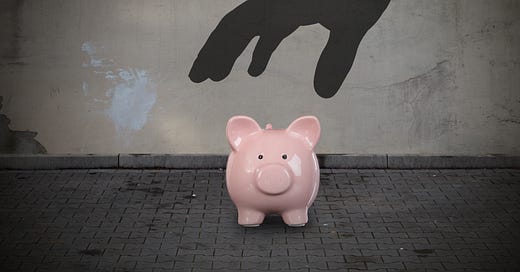At 53, Bucking the Great Resignation
After being scammed out of some savings, Martha Bayne rethinks the Gen X play book as it pertains to work and financial security.
Late last spring, I got scammed. Over the course of a few baffling minutes on the phone another human being efficiently liberated my bank account of a sum in the mid four figures. As life savings go, it was small beans. But it was a sum for which I had worked diligently. A sum that I was counting on to see me through the lean weeks of a second COVID summer. And a sum that, eight months later, I have yet to recover and at this point must accept that I never will.
I’m not telling this embarrassing story as a bid for pity. And please, do not offer advice, for I have heard it all. But it was the moment something snapped. Long ago I got deft at fielding parental queries—“Don’t click on that.” “No, there’s nothing wrong with your warranty.” Now here I was, the mark, sitting in stunned disbelief. I’m only 53, I thought. This can’t have happened to me. But it did, and it had an unexpected consequence.
Long ago I got deft at fielding parental queries—“Don’t click on that.” “No, there’s nothing wrong with your warranty.” Now here I was, the mark, sitting in stunned disbelief. I’m only 53, I thought. This can’t have happened to me.
We’ve all heard about the Great Resignation. As the pandemic stretches into year three and new variants of the virus roll across the country, yanking ever-harder on the fraying threads of our social contract, exhausted people nationwide are quitting the rat race in the face of endless crisis. A collective cry of carpe diem, and a fuck-you to late-stage capitalism, the Great Resignation was the story of 2021.
Me? I got a job.
It’s not that I haven’t been working. But I’ve always had a fraught relationship with professional ambition. As a young adult incubated in the underground of 1980s Seattle and hatched out of Oberlin into the ‘90s recession, I latched onto the odd notion that seeking to climb the economic ladder was shameful, or at least pointless. I should hold myself to a higher calling—truth, art, beauty, justice. My ideals may have been half-baked (and it’s not like I was making much art, either) but as any good Gen X’er can tell you, they can be pretty hard wired, and, well, the least cool thing you could do in the early 90s was care about your career. For the thirty years since, practical considerations like stable income have rated somewhere below intellectual stimulation, social mission, cultural capital, or just plain because it sounded fun as reasons to take a job. Even as I beat myself up for continuing to struggle long past the date when my peers figured out how to get paid, I still held on.
This attitude would be easier to understand were it undergirded by a foundation of family money or spousal support. I had neither. But it was undeniably a crafty bit of psychological self-preservation. Meaningful, full-time work is hard-to-impossible to find, so why waste energy longing for the unattainable? And it’s also a product of some experience—because I did have one of those once. For ten years I had a job that I loved, even if it paid the absurd mean of alt-weekly wages. When I left that job I was gutted, and vowed I would never again let a mere workplace stake such an all-consuming claim to my soul. I joined the gig economy and didn’t look back.I freelanced, I tended bar, I wrote a book.
My ideals may have been half-baked, but as any good Gen X’er can tell you, they can be pretty hard wired, and, well, the least cool thing you could do in the early 90s was care about your career.
In the early days of the pandemic, I was lucky, luckier than so many. Rather than the sudden unemployment visited on friends in the service industry, I was busier than ever. I volunteered at a food pantry, I organized fundraisers, and—already a remote worker—I juggled three part-time gigs. I felt charged with purpose. I got so much done! And each month I watched from my solitude, with mild wonder, as the figure in my bank account ticked slowly upward. It was not a lot, by any standard of wealth, but it was certainly more than I was used to having and at some point I connected the unfamiliar sense of calm underpinning mundane purchasing decisions—the grocery store; the Target—to the zeroes in my savings account.
“Oh,” I thought. “This is how rich people feel.”
And then, on the day I got my second Covid shot—the same day that science was supposed to render me invulnerable—I watched as though through glass as the money I had been socking away disappeared in a digital blip.
In the weeks that followed, as I filed fraud alerts and changed all my passwords and opened new bank accounts, I tried to sort through what hubris allowed this to happen. Just because I’d managed to save a little money and so far not get sick, was I supposed to be immune to danger? Had the hypervigilance of Covid damaged my inner skeptic? Was I distracted, the victim of a skilled criminal, or just a dope? What made me think I was so special? That I was not at core the sort of dithering biddy who gives their social security number to the nice man on the phone? That I was not, in a word, vulnerable—and only going to get more so as I got older?
What made me think I was so special? That I was not at core the sort of dithering biddy who gives their social security number to the nice man on the phone? That I was not, in a word, vulnerable—and only going to get more so as I got older?
In an era that has made brutally clear that uncertainty is the only thing left certain, in which the health and security of the world hangs by a syringe and the fate of democracy by a senate vote, getting scammed forced something loose that Covid and the Trump era had not quite managed. So much has been lost these past two years, but lost to the pandemic as well, now, was the belief that I didn’t need stability—that it was something not for me, and thus something I did not crave. This spring, counting my pennies and salving my pride, I wondered: what if taking yourself seriously meant to treat financial health and emotional security with the same respect that your younger self once believed you should treat your process of self actualization?
A few weeks after the scam, a friend forwarded me a job posting. It was a good job, in my field. It had benefits and PTO. It promised stable income. My desire brought me up short, an electric shock up my spine: “I want this.”
I dropped everything and sent in my stuff. And as I progressed through the interview process and accepted the offer, I had to shush my inner critic, the one whispering “sellout” in my ear. Because, really, it’s absurd. Here I was finally allowing myself to own up to wanting stability, something I had internalized a proscription against at a young age, as my snarky teenaged ghost tries to make the case that living in precarity, with inadequate healthcare and a moth-eaten safety net were some way of still sticking it to the man. What was wrong with me?
While all this was happening the past year and change, while millions were dying and democracy was crumbling, I also fell in love. Something else I for years did not believe I was allowed to want.
It has been, for sure, an immense privilege to live a fiscally haphazard life. I have had the freedom to be nimble. I’m not supporting another human, or dependent on another for support myself, and have largely not been subject to the structural forces that wedge so many into the economic margins. I recognize this privilege while also coming to understand with the clarity of age just how much, in my younger days, a standard-issue parade of misogynists, harassers, and predators impacted my sense of what was possible, both inside and out of the workforce.
And here I have to come clean. Because I can’t write about my decision to get a full-time job—one that so far is pretty great—without also recognizing that while all this was happening the past year and change, while millions were dying and democracy was crumbling, I also fell in love. Something else I for years did not believe I was allowed to want.
I’m hesitant to say much about this—it’s private!—but I can say that the pandemic, and losing my savings as an indirect result of the chaos it engendered, has allowed me to remove my relationship to work to a better, more mature place. Here, what I do for money is practiced in fuller awareness of both vulnerability and the fragility of this new bond I cherish.
Getting scammed forced me to face the actuality of age and the limited time I have left, and open up space for the rest of my short life to stretch and grow, in all its messy actuality with another human. I’m taking it seriously, even if I can’t help but laugh. Because while I may actually be well aligned with the Great Resigners in this quest for balance, getting a straight job at this particular cultural moment may well be the most contrary, GenX move yet.
PS: Scams have proliferated like a mutating virus in the past year, and contrary to popular stereotype, the most likely victim is a person in their twenties, not their dotage. But regardless of your age, here are a few commonsense strategies for avoiding becoming one yourself. Like me, you probably think you already know all of this. But just remember: there is nothing wrong with your car warranty, and your bank will never, ever call you first.







Thanks for these thoughtful comments! I'm glad the piece resonated, in whatever way it did, and that you all took the time to offer feedback.
I don't know you, Martha, but I like you so much! This essay is gold. So are you and I hope the new relationship you're incubating will be, too.